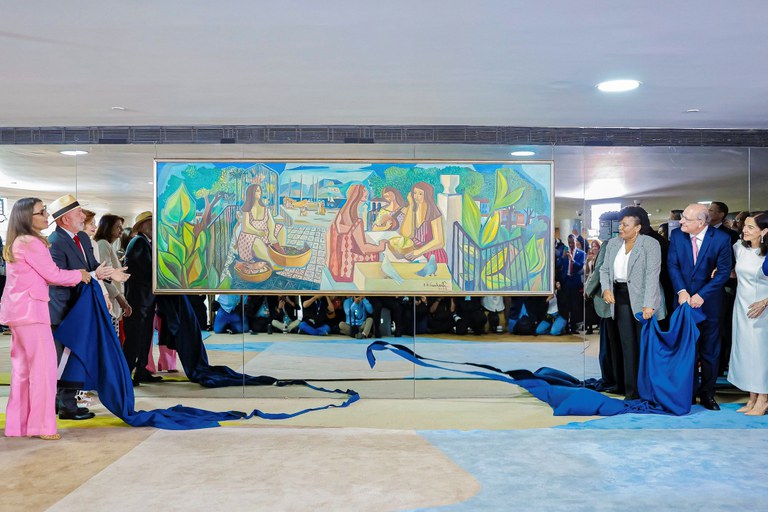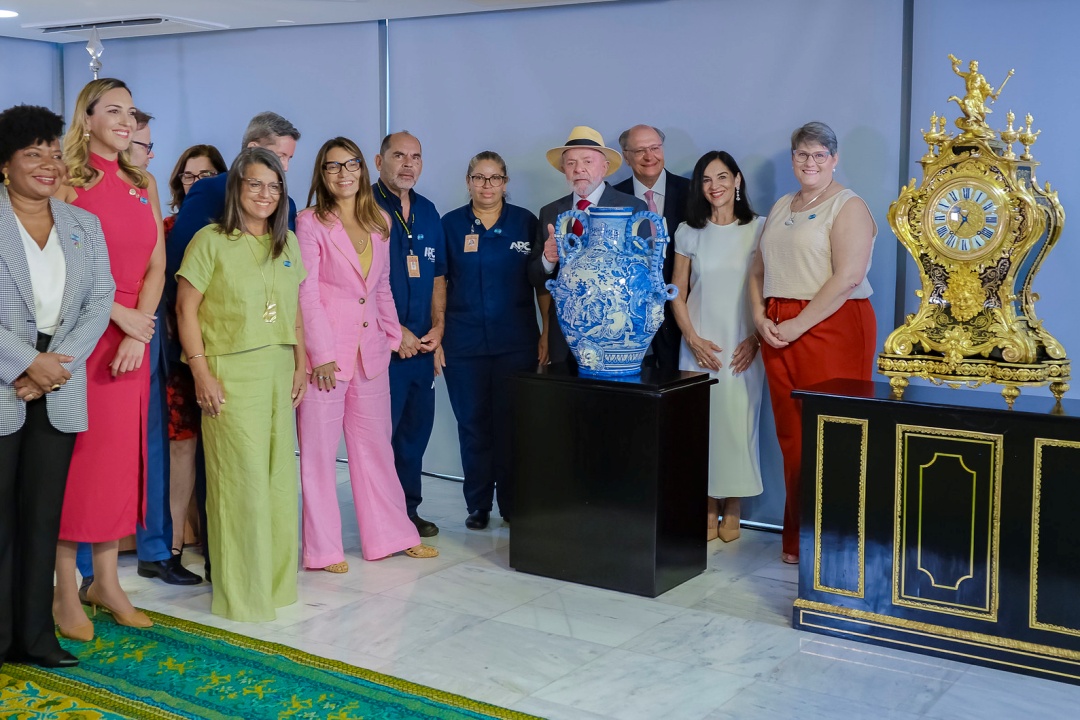Notícias
JANUARY 8
Restoring democracy: 21 artworks return to Planalto Palace

President Lula and Vice-President Geraldo Alckmin unveil Di Cavalcanti's painting As Mulatas, which is being reintegrated into the collection of the Presidency of the Republic. Image: Ricardo Stuckert / PR
Two years after the acts that destroyed important items of Brazil's historical and cultural heritage in the attack on Planalto Palace in 2023, 21 restored artworks were handed over to the Brazilian people on Wednesday, January 8. President Luiz Inácio Lula da Silva and Vice-President Geraldo Alckmin unveiled the cloth that marked the reintegration of Di Cavalcanti's painting As Mulatas into the presidential collection. Measuring 3.43 meters wide and 1.12 meters high, the painting was stabbed during the acts of vandalism on January 8, 2023.
Democracy is a very big thing. For those who love culture, only in a democratic process we are able to achieve this. Otherwise, the works would have been destroyed forever, victims of the hatred of those who know that art and culture carry the history and memory of a people” – Luiz Inácio Lula da Silva, President of the Republic
Moments before, the president attended the handover of an Italian amphora that had been shattered to pieces and a 17th-century clock crafted by Balthazar Martinot and André Boulle. This recovery was made possible through collaboration with the Swiss government. “Democracy is a very big thing. For those who love culture, only in a democratic process we are able to achieve this. Otherwise, the works would have been destroyed forever, victims of the hatred of those who know that art and culture carry the history and memory of a people,” stated President Lula.
Twenty of the restored works underwent restoration in a laboratory set up at Alvorada Palace by professionals who dedicated more than 1,760 hours of work under a technical cooperation agreement involving the Federal University of Pelotas (Universidade Federal de Pelotas), Iphan (Instituto do Patrimônio Histórico e Artístico Nacional) and the University of Brasilia (Universidade de Brasília /UnB). The clock was restored in partnership with the Swiss government, an endeavor that required more than 1,000 hours of painstaking dedication.
COLLECTIVE EFFORT - First Lady Janja Lula da Silva emphasized the significance of the collective efforts from numerous civil servants in restoration both the palaces’ infrastructure and the values and memories that represent the Brazilian people's commitment to democracy. “This was expressed in the tears of the workers of Planalto Palace, after seeing the space they care for with so much affection, love, and dedication treated with such inhumanity. Today, those tears have turned into smiles at the certainty that we have kept democracy strong. Art, in its different forms, keeps our memory and the history of our country alive,” she declared.
RESTORATIONS - The restored artworks include paintings, sculptures, and historical artifacts. “Today, the Federal Government is returning to the population works restored by 50 conservators, including both faculty and students receiving scholarships. Since January 2, 2024, nearly 2,000 hours of work have been completed. Alongside the conservation laboratory, these resources have enabled 500 public school students to access an extraordinary heritage education experience, culminating in the publication of a book that immortalizes this endeavor,” emphasized Leandro Grass, president of Iphan.
HARD WORK — Approximately 50 professionals were directly involved in the restoration, including 12 professors, four technicians and 14 undergraduate students from UFPel (Universidade Federal de Pelotas), along with three students and two professors from UnB (Universidade de Brasília), and five specialized conservators-restorers, with the collaboration of professionals from the photography and audiovisual areas. “It was not an easy task. The role of UFPel in the restoration is an example of how these institutions can mobilize resources and expertise to deal with crises and help rebuild important assets for the nation. The possibility of putting civil servants, teachers, technicians and, above all, students at the disposal of and in defense of democracy, the fundamental role of our public higher education institutions,” stated the dean of the University of Pelotas, Isabela Andrade.

- Ânfora italiana e o relógio histórico do Século XVII: restaurados. Foto: Ricardo Stuckert /PR
CLOCK — One of the oldest pieces in the Presidency's collection is the table clock made by Balthazar Martinot and André Boulle. At no cost to the Federal Government, it was restored under a Technical Cooperation Agreement with the Swiss Embassy. It was sent to the European country and returned fully restored in less than 12 months. The company responsible for the restoration was Audermars Piguet. “Switzerland is proud to have contributed to Brazil's efforts to restore the historical heritage of all Brazilians. We are convinced of the importance of protecting cultural and artistic heritage, which form the country's identity, as well as history and our common values. I think it is fundamental to value and take care of our relations, our friendship, our rights, human rights, and our democracies, which are delicate and at the same time resilient, like this clock that is now returning to the country,” said the Swiss Ambassador to Brazil Pietro Lazzeri.
IMPACT — The project had an impact on local schools and communities, with actions aimed at heritage education and recognizing the importance of cultural heritage. In partnership with the University of Brasilia (UnB) and the Federal University of Pelotas, the project promoted various activities in schools in the Federal District, involving more than 500 students from public schools in Ceilândia, Planaltina, and Asa Sul through workshops, lectures, and exhibitions.
RESISTANCE - For Brazil's Minister of Culture Margareth Menezes, the workshops were one of the greatest achievements. “They not only convey the link between culture, memory, and art but also reinforce the true meaning of democracy for young people. No one can tame or muzzle cultural and artistic expression. Culture has resisted,” she pointed out.

